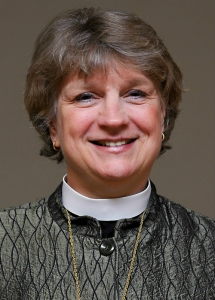 By Bishop Ann Svennungsen
By Bishop Ann Svennungsen
How important is it for a pastor to know how to form and lead a healthy community? In addition to teaching pastors how to preach, teach, and provide pastoral care, should seminaries teach students the skills to build community?
This was not a part of the curriculum in the 1980s when I received my M.Div. My classmates and I believed that, when we were called to a congregation, we basically “inherited” a community. The community was already there, already formed. Our job was not to break it.
“What are practices you believe are essential for healthy communities?”
Today, church leaders ask if something vital is lost by our failure to intentionally prepare pastors for this work. I am part of a cohort studying exactly this – a group of pastors, theologians, and bishops funded by a generous grant from The Lilly Endowment.
We just finished a conversation on Christine Pohl’s Living into Community: Cultivating Practices That Sustain Us. Believing that beloved communities are one of the critical ways we witness to the grace and power of God in the world, Pohl suggests four key faith practices that are essential to building healthy communities:
- Gratitude
- Promise-Making and Promise-Keeping
- Truth Telling
- Hospitality
AT THE SAME TIME as I’ve been reading Pohl’s book, our synod staff has been studying Patrick Lencioni’s work on Team Building. I’ve been delightfully surprised to notice the convergence between the two books. According to Lencioni, a healthy staff team commits to five key practices:
- Trust
- Commitment
- Openness to Conflict
- Accountability
- Attention to Results
There’s lots of alignment between Pohl and Lencioni. Still, what they ask of us isn’t always easy. Some of the practices are difficult. And, some are easier for you than they are for me. (For instance, this descendant of Northern European immigrants isn’t a natural when it comes to saying that “openness to conflict” is a good thing.)
I wonder how we might learn from each other – how we might strengthen this conversation in our synod. What are practices you believe are essential for healthy communities? When have you experienced healthy/unhealthy community? What have you learned?
In these ordinary days after the Festival of Pentecost – sometimes called the season of the church – maybe we can focus on such questions. And we can work intentionally towards our church as home to many beloved communities.
